Kinesiology students help bring recovery to 9-year-old victim of a brain injury
From sword fighting to Uno, Lipscomb’s exercise science students bring the fun to therapy sessions for Will Terry, recovering from a brain bleed and stroke.
Janel Shoun-Smith | 615.966.7078 |

Exercise Science juniors Chlo'e Lambert (left) and Kristen Youngblood (right) work with Will Terry (center) on his exercises to help him recover from injuries suffered in May 2020.
Will Terry has faced more challenges in his nine years of life than most of us face in a lifetime. But he continues to defy the odds, especially when he has the help of his “college friends” from Lipscomb University’s kinesiology program.
Despite his birth with Noonan Syndrome, a genetic disorder that prevents blood clotting, Will was still thriving in his Nashville home with mother Catherine (LA ’03, ’06, M.Ed. ’08), the former director of educational effectiveness for the College of Pharmacy, his father Adam Terry (’04, MBA ’11) and younger siblings Callie Grace, 7, and Brooks, 3.
His life became harder on May 5, 2020, during a trip to Florida, when he suffered a scooter accident causing a brain injury that left him in a coma. The injury caused a stroke which damaged his brain. Since that time last year, he has had to relearn all his motor functions: sitting up, holding his head up, standing up, walking, eating, moving his arm and legs were all challenges he faced during his long recovery, which is still ongoing.
Since August 2020, however, he has had the help of not just his family and his health care providers, but from students in Lipscomb’s exercise science program as well. They came out to the Terrys home two days a week in the fall and now five days a week this spring to go through his physical therapy exercises and play games designed to strengthen his muscles, balance and stability.
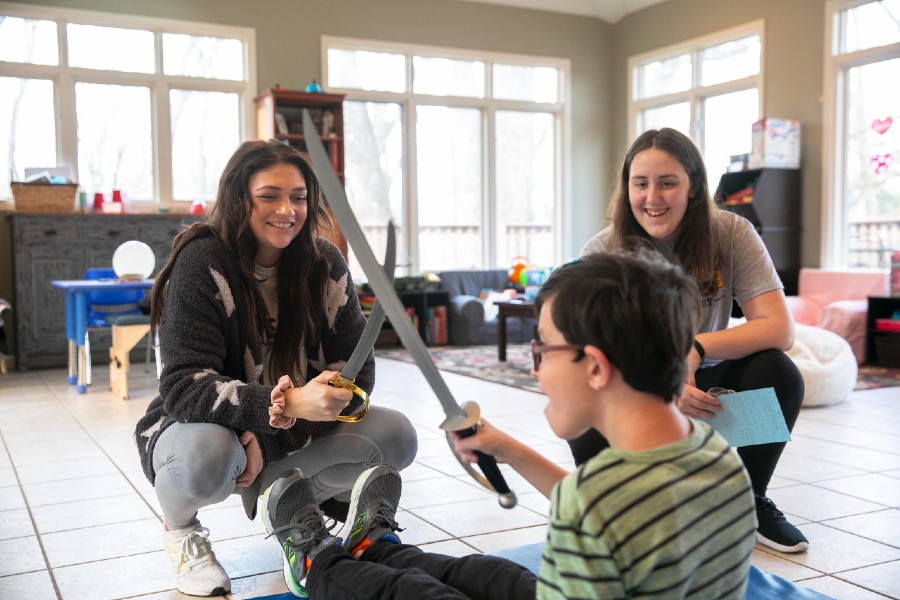
Each time Will completes a sit-up he gets to do a little sword-fighting with Chlo'e Lambert to further strengthen muscles and agility.
“It was the highlight of my week, just to see him smile and see him enjoy doing his exercises, even the ones he didn’t want to do,” said Nathan Lowery, a senior kinesiology major who worked with Will during the fall semester. Lowery has known the Terry family his entire life, he said.
“When Will was a toddler, his parents were told that he may never speak the way other kids do. He had already defied those odds, and he defied the odds by coming out of his coma, so it was just a great joy every week to experience his joy.”
And there was plenty of it. According to Catherine, Will asks every day, “Are the college kids coming?”
“He just loves them,” she said. “He would do anything they say. Even stretches and exercises he doesn’t like, they can get him to do it.”
Which is a big help for Will’s physical and occupational therapists at Vanderbilt Hospital, who can focus on teaching rather than practicing new exercises during sessions, she said.
“Will works hard at his Vanderbilt physical therapy session, but they are definitely not as cool as his college buddies,” laughs Catherine. “The therapists will often say, ‘Tell your college friends you need to work on this.’”
Sessions with the Lipscomb students involve sword-fighting with a pirate sword while doing sit-ups, picking up a favorite wooly mammoth toy from the floor to practice squats and balance, watching “Dinosaur King” while using his ergometer, an exercise bike that measures performance.
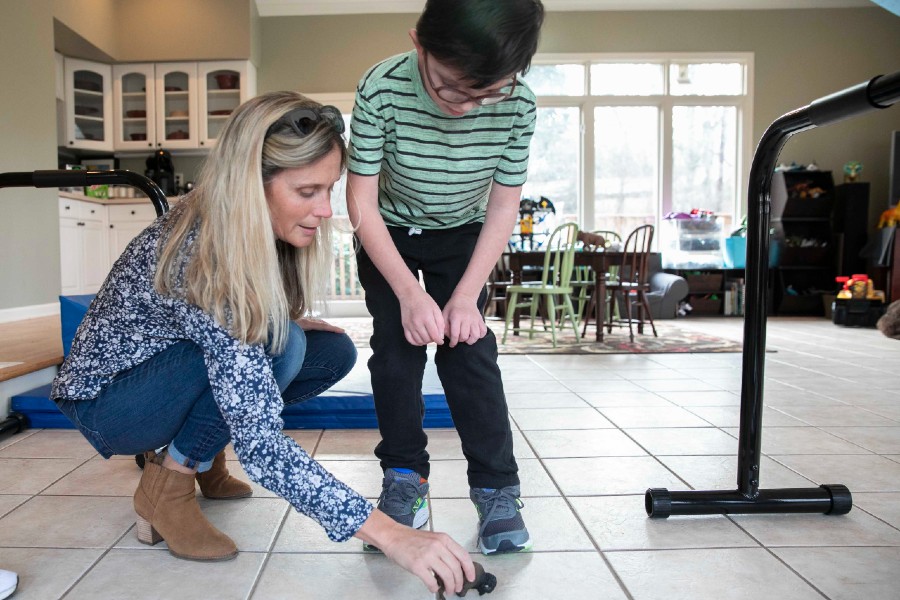
Will's mother Catherine Terry, who now works in Lipscomb's provost's office, is the the former director of educational effectiveness for the College of Pharmacy.
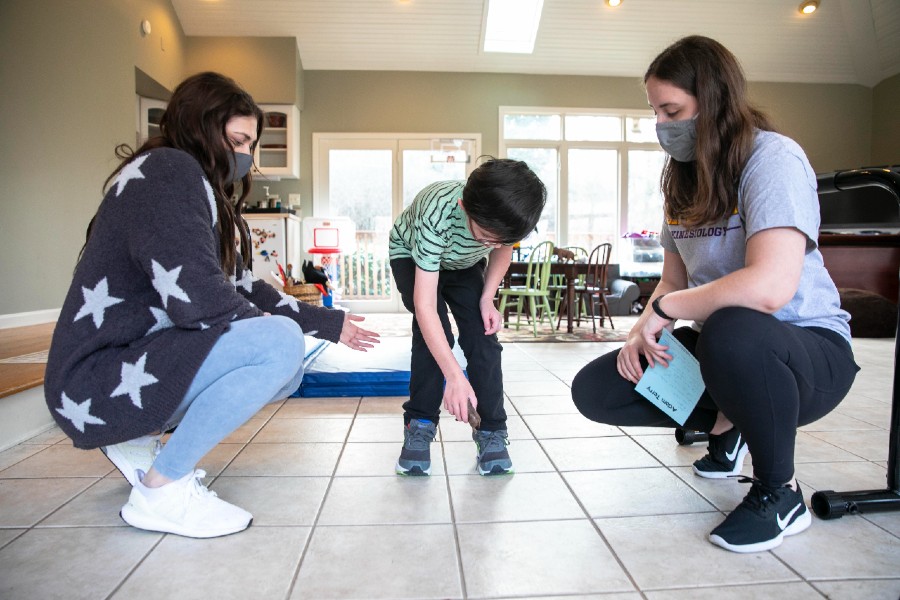
Sessions with the Lipscomb students involve picking up a Bison or wooly mammoth toy from the floor to practice squats and balance.
That’s exactly what Ruth Henry, vice chair of kinesiology and nutrition, had in mind when she contacted the Terrys back when the 2020-21 school year started to propose the idea as a service-learning project within the Strength and Conditioning Program Design course.
The course traditionally includes a service-learning component, but the opportunities were more scarce during the pandemic as some of the community organizations Henry usually works with, such as senior living centers, didn’t have the option to hold in-person classes.
When she read Catherine’s blog describing Will’s road to recovery since his accident (Catherine is now the associate provost for academic and strategic initiatives at Lipscomb.), Henry knew that her students could make Will’s physical therapy even more effective.
“Service-learning is one of the most valuable things our students can do,” Henry said. “Students are sometimes hesitant, but after the first day or two they always say, ‘This is really worthwhile,’ because they enjoy getting to work with real people, and not just their classmates.”
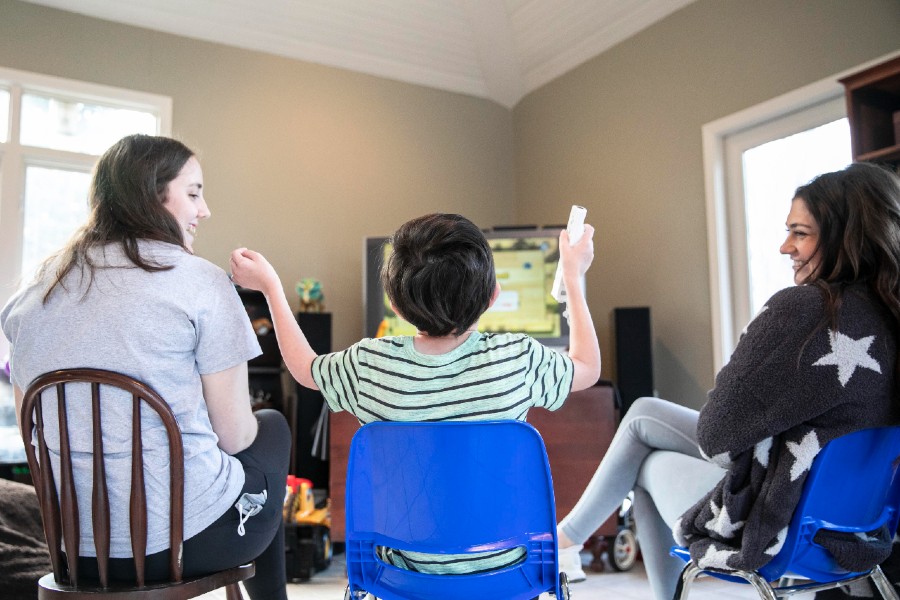
Playing on the Wii helps Will's upper body movement when he has to cast a fishing line or shoot a basketball.
Not many would want the kind of real-world experience the Terrys had this past year. Diagnosed with an epidural hematoma, or a brain bleed, Will underwent one surgery to relieve pressure on his brain while still in Florida. At various times his parents were told he wasn’t expected to live through the night; then he wasn’t expected to live through the week, Catherine said.
Will was quickly transferred to Vanderbilt Medical Center in Nashville, where he went through two more surgeries. Then on June 12, he went to Children’s Healthcare of Atlanta for six weeks of rehabilitation.
By the new year, he was able to walk a little bit independently. Now back in Nashville, the family takes him to 10 sessions each week for physical, speech and occupational therapy.
From an academic point of view, the partnership with the Terrys is valuable for Lipscomb’s students, because many were having a hard time finding opportunities during the pandemic for job shadowing and clinical practice hours, said Henry. Those types of resume-boosting experiences are what physical therapy and occupational therapy graduate schools routinely look for to show commitment to the field, she said.
“I had observed in some physical therapy clinics, but this was actually guiding him through the exercises. It was very hands-on, but also a safe environment to learn,” said Megan Long, a senior exercise science major who has been accepted to Belmont University’s PT graduate school.
Henry recruited five student volunteers for the fall semester and 10 for the spring semester. The students go out in pairs to the Terrys’ large playroom with toys for all three kids scattered about. One serves as a spotter while the other guides Will through the slate of exercises prescribed by his physical therapist.
Then they do some extra activities such as walking with his walker, standing up on his own to play Uno (his favorite game) or playing a game on the Wii that requires upper body movement, such as basketball, sword-fighting, ping pong, fishing and bowling, said Savannah Gibson, a senior in exercise science major from Franklin, Tennessee, who worked with Will this past fall.
Will says his favorite activities are certainly Uno and the Wii, where he engages in his fair share of playful bravado, through sign language and body language, about his victories over his college buddies. “Will is the Uno king,” laughs Long. “Once when I beat him, he got so upset, he would point at me and gesture that I was ‘going down’!”
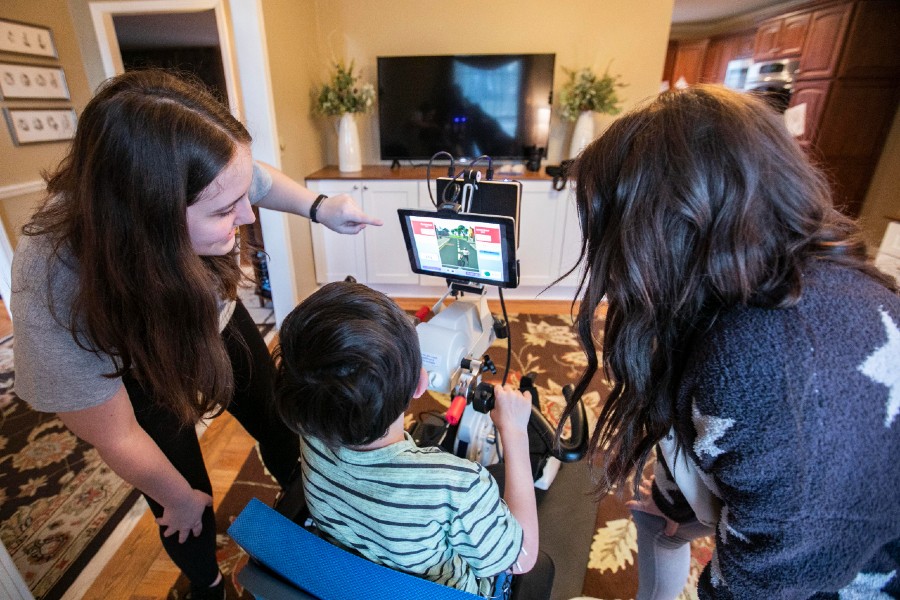
An FES bike provides functional electrical stimulation of the muscles while the user operates it. Will's bike has a computer screen that allows him to watch cartoons or to pedal down an animated street.
Some days he works on his stationary functional electrical stimulation bike. An FES bike can be used with arms or legs and provides functional electrical stimulation of the muscles while the user operates it, thus optimizing the physical activity toward specific therapeutic goals.
The FES bike was “a tremendous gift,” said Catherine, as it cost $28,000 and was purchased through donations. It is set up specifically for Will’s needs and it provides a unique experience for the Lipscomb students to work with such a cutting-edge piece of equipment. Even the Vanderbilt rehab clinic doesn’t have this piece of technology, Catherine said, and every student interviewed for this piece mentioned how amazing the FES bike is.
“Working with patients is definitely something I am interested in, especially after working with Will,” said Gibson. “The experience helped me narrow down (my career path), reinforcing that I do want to work with people and work with them long-term to see their progress and motivate them in any way I can.”
“I got to see a lot of improvement, which was really special,” said Long, who said that early in the fall semester, Will couldn’t sit up or stand on his own. By the end of the semester, however, he was able to walk on his own for short periods. By February, he could pedal almost five miles in about half an hour on his FES bike, Catherine said.
Although Will’s body needs to be re-taught his fine motor activities, “He’s the same Will Terry on the inside,” said his mother. “He still loves dinosaurs and elephants, and remembers his school work. He is at or above grade level in reading comprehension,” she said.
In June, after the accident, the family still didn’t know how much he would eventually be able to communicate. Doctors indicated that more than likely, Will wouldn’t be able to walk, talk or eat because of where the stroke occurred in the brain, Catherine said.
But he could move his right arm just a little at that time, she said. Thinking he might be able to use that movement to answer yes-or-no questions, Catherine wrote a series of words on paper towels and asked him to raise his arm when he saw the word “elephant.” Sure enough, his right arm responded to seeing the word for his favorite animal.
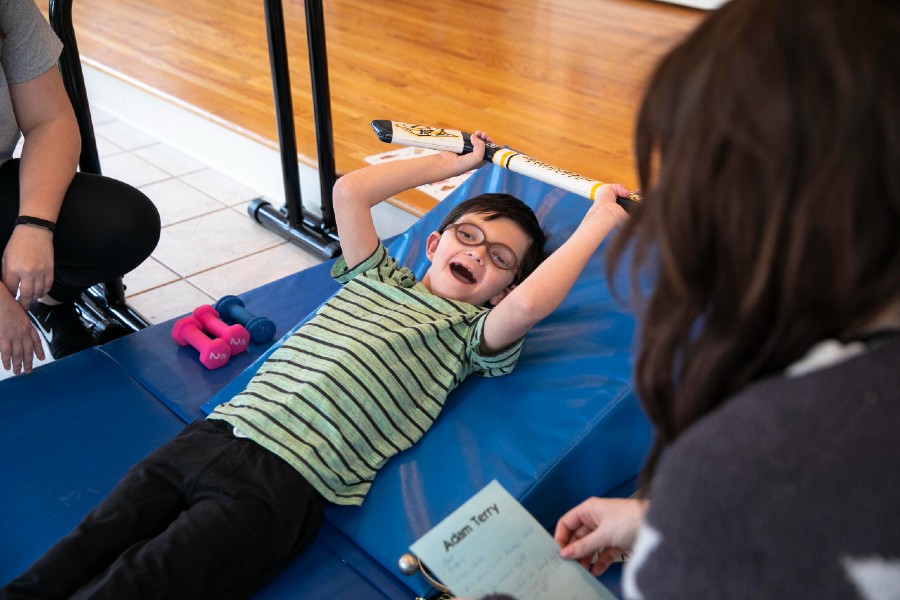
Exercise Science juniors Chlo'e Lambert (left) and Kristen Youngblood (right) help Will terry go through the exercises prescribed by his physical therapist.
While he cannot speak, he communicates all day long through sign language, typing on his tablet and body language, said Catherine. “There is no lack of communication going on,” she said.
A couple of his college friends in the fall actually knew sign language, which was an advantage, said Gibson. Learning how to teach an exercise with a patient who cannot communicate in the traditional way was one of the most valuable lessons Lowery learned through the experience, he said.
“He couldn’t tell us if he had done as much activity as he was able to do, so we had to watch him more closely,” Lowery said, who plans to go into physical therapy for orthopedic or post-operative patients. “He would sometimes grab his iPad to type a message, but nonverbal communication was more important. For a child patient, you have to show the techniques more than just describe them. You have to get down on the floor and do things with him, so he can see how to do it.”
PT exercise for Will includes stepping up on a step, walking across a foam mat to increase his stability, modified sit-ups and bridges and stretches for his legs and arms, Lowery said.
“Will is very motivated by them,” Catherine said of his college friends. “They motivate him to get better and to try hard things. It gives the family a break to do what we need to do to help him get stronger and better.
“He has been hesitant to be without one of us, but when his college friends are in the house he could not care less about us! He gets his independence for a while. He gets to just be a kid.”
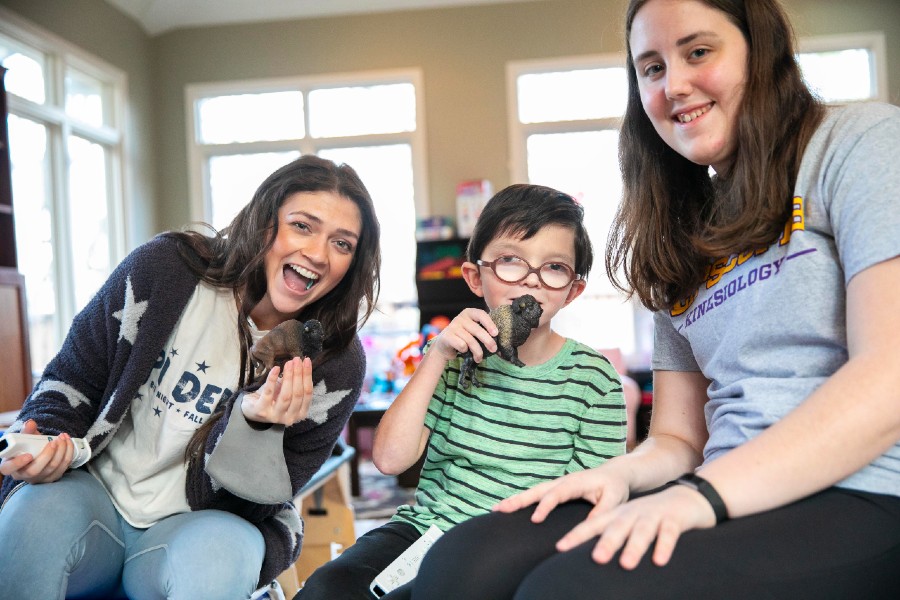
"They motivate him to get better and to try hard things. He gets his independence for a while. He gets to just be a kid," said Catherine Terry.
--Photos by Kristi Jones